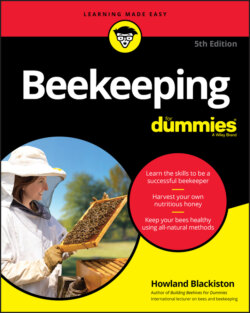Читать книгу Beekeeping For Dummies - Howland Blackiston - Страница 8
Foreword
ОглавлениеFor many people, the allure of beekeeping is a strong one. Now more than ever, beekeeping is not only enjoyable, fascinating, and rewarding, it is critically important!
There is so much we can learn about our world from keeping bees. As the noted Nobel Prize-winning ethologist Karl Von Frisch wisely said, “The bee's life is like a magic well: The more you draw from it, the more it fills with water.” Beekeeping is indeed a bottomless well of learning and a pastime that leads to years of enjoyment and benefits.
One thing I find particularly rewarding is the connection that beekeeping gives me to the natural world around me. I believe that deep down we all long for this connection to nature. I have found that beekeeping is a wonderful way to achieve this connection. It fosters a respect and curiosity about the myriad interrelated intricacies in the ecosystems that surround us.
We all benefit from having honey bees on the landscape around us. Our flowers, vegetable gardens, and fruit trees benefit from having these intrepid pollinators visit. Indeed, honey bees have become an essential part of our vast agriculture system through their pollination services. We need to maintain a healthy landscape in order for bees to thrive and survive. Our food system literally depends upon it.
The world of beekeeping for hobbyists and professionals alike has changed significantly over the years. Today, successful beekeepers are required to know much more than in the past. They need to monitor their bees more closely and pay close attention to what is happening in the environment around them. It is essential for beekeepers to know about bee nutrition, parasites, pathogens, and the pesticide exposure that the bees might encounter as they forage.
The good news is that along with the challenges, there have been huge advances in our collective knowledge about bees, bee biology, behavior, and genetics. Intensive studies are being done by an enthusiastic field of scientists, university research laboratories, and citizen scientists sharing data from their hives. There is an ever-growing population of people excitedly starting to keep bees around the world, in both backyards and urban environments. They share their experiences in clubs, on the Internet, and via social media. This makes beekeeping even more rewarding and connected than ever before. Farmers, landscapers, and gardeners have made big strides in creating landscapes that are designed to benefit all pollinators as we learn that healthy and balanced “farmscapes” as well as landscapes are more important objectives than having giant lush green lawns.
Beekeeping For Dummies has kept up with the many advances and innovations in beekeeping. This fifth edition is an important one. Inside the book you will find a lot of new information about honey bee nutrition and health. This edition brings the latest knowledge from the labs to our backyards. Plus, there are many tried-and-true techniques and a wealth of essential beekeeping fundamentals.
By now, most people know that bees and pollinators of all types are under threat. Beekeeping is an important part of a multifaceted solution for helping save our pollinators. We need to reduce our pesticide use, plant diverse forage, support our local farmers, and educate our children and our legislators about ensuring pollinator-friendly habitats. By keeping bees responsibly, you will be doing your part.
In my own 30-plus years of backyard beekeeping I have continually learned from fellow beekeepers, books, articles, and, of course, from my mentors.
Beekeeping For Dummies, 5th Edition, fills all of these roles with a balanced combination of concise and accurate information; helpful tips; thoughtful, enthusiastic encouragement; and a sincere and heartfelt admiration for honey bees. Howland Blackiston’s deep love and respect for honey bees shines through on the pages of this latest edition of Beekeeping For Dummies.
I have found beekeepers to be an extremely collegial group of people. They enthusiastically share their own experiences and knowledge with other beekeepers. The best beekeepers watch, listen, and learn from their bees. This is the spirit that you will find that in the pages ahead. Enjoy.
Peter Nelson
Director, Producer, and Cinematographer of the multi-award-winning documentary film, The Pollinators
www.thepollinators.net
